
“A Piece of My Mind”
June 2022 Newsletter
Advancing Christian Faith and Values,
Defending Religious Liberty for All,
Supporting Civility and the Common Good
through Preaching, Teaching, Writing, Activism and Reasoned Conversations


Memorial Day: Honoring a Schoolmate Killed Doing Heroic Service
I didn’t know David Winder well. His class was ‘64; mine ‘62.
He joined the U.S. Army and went to Vietnam in November of 1969 as an unarmed senior medical aidman. On May 13, 1970 his company came under intense attack in a rice patty and found themselves up against automatic weapons and rocket-propelled grenades.
 PFC Winder crawled under fire to reach wounded soldiers. In spite of his own injuries he treated one wounded soldier. Before he could reach another he was mortally wounded.
PFC Winder crawled under fire to reach wounded soldiers. In spite of his own injuries he treated one wounded soldier. Before he could reach another he was mortally wounded.
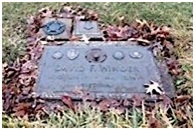 For his selfless effort to serve the fallen, he was awarded the Medal of Honor posthumously. He was 23 when he died.
For his selfless effort to serve the fallen, he was awarded the Medal of Honor posthumously. He was 23 when he died.
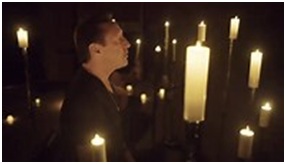 John Lennon’s “Imagine”
John Lennon’s “Imagine”
For the first time ever, Julian Lennon sang his father’s song “Imagine” in public for a “Stand Up for Ukraine” rally. I learned this watching ABC News, which played excerpts of the beautiful song.
Later I looked at all the lyrics of “Imagine,” not just words sung on ABC News. Some of you may know it all by heart, but I don’t. Some phrases:
Imagine there’s no heaven
It’s easy if you try
No hell below us
Above us only sky…
Imagine there’s no countries
It isn’t hard to do
Nothing to kill or die for
And no religion too…
Imagine no possessions
I wonder if you can
No need for greed or hunger
A brotherhood of man…
Lennon imagined a world where people believe this life is all there is. No heaven or hell, therefore no accountability beyond what might happen here.
The world is one, without nations or borders. No call to fight or die for your country, for there are no countries.
And there is no religion, the people’s opiate, the source of what hinders universal peaceful brotherhood. Even the old liberal religious idea of “The Fatherhood of God” over the brotherhood of man is fanciful and unnecessary.
And there are no private possessions with the greed and lack of brotherhood that goes with them. Instead everyone together happily shares the world.
This idea of a nirvana centered on the ideal possibilities of a humanity that has rid itself of religion* and is free of borders and possessions was attempted in 1917 and after by various Marxist entities promoting materialism, internationalism, atheism, collectivism (these parallel the above “Imagines”).
Marxist experiments have been utter failures. Pathways to its idealism have led to bloodshed, oppression, suffering, famine and want, and tens of millions of deaths. The perfect society never quite arrives. So “the dictatorship of the proletariat” rules as we await the elusive nirvana.
Years ago I heard a lecture at the University of Southern California by a graduate student working on a double doctorate (theology and economics). He advocated Marxism as the key to human flourishing. I walked with him to lunch and asked him, “Are there any working models of your theory anywhere in the world?” He said no, there weren’t any.
He has to have more faith than I have to embrace his own “Imagine” vision.
* My opinion: when a secular authority eliminates religion, the secular authority itself becomes the new official religion. Alternatively, the secular system may try to domesticate religion to be a mouthpiece of the state. This is attempted in China today. Authoritarian and especially totalitarian systems cannot tolerate religion’s independent and contrary voice. So long as the U.S. has robust freedom of religion (and with it free speech and freedom of assembly), religion will never be subjugated or “cancelled” by the state.
Family Member Has Pleasant Surprise at Texas Airport
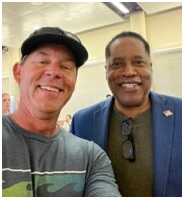 Son-in-law Rick Turner was waiting with friends at the San Antonio airport for a flight to LA when they noticed recent California gubernatorial candidate and talk radio personality LARRY ELDER
Son-in-law Rick Turner was waiting with friends at the San Antonio airport for a flight to LA when they noticed recent California gubernatorial candidate and talk radio personality LARRY ELDER
sitting a few feet away.
Rick said, “Hi Larry! How are you?” Larry smiled and walked over to shake hands with Rick and his friends. They all joined in a lively conversation. Rick summed up the encounter this way: “His personality was very inviting and engaging. He seemed to be enjoying himself during our time together. I know we did.”
Day of Rejoicing: Worship in the Book of Nehemiah
(Or: “Church Choirs—To Be or Not To Be?”)
– 5th Essay on Worship for 2022
I love many styles of worship. I’ve worshipped in Pentecostal churches out in the countryside. I’ve played the piano in “Hillbilly G” while people clapped, sang and danced in the aisles. I’ve also worshipped in majestic sanctuaries and been thrilled to hear the pipe organs.
My very earliest worship experience was in a formal Lutheran church. Sunday morning worship services began with a grand processional. The pipe organ lifted its volume and began to play the first hymn. At just the right moment, as the choir reached the halfway point down the long center aisle, the choir would start to sing and a thousand worshippers would join in.
The choir was followed by acolytes carrying various ornaments of worship and by the choir director and pastors. The choir would take its positions to the right and left of the altar, the pastors would pray before the altar—all this during the first hymn.
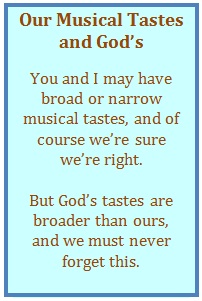 The theological term for this worship experience is “Whoa!”
The theological term for this worship experience is “Whoa!”
Is there biblical PRECIDENT for such worship? O yes!
Two great biblical scenes for choral worship: (1) The great assembly around God’s throne in Revelation 4-5; and
(2) the two choirs at the dedication of Jerusalem’s wall in Nehemiah 12. The angelic hosts reciting “Glory to God” to the shepherds when Jesus was born should be noted also.
But is there a biblical CALL for this kind of worship in our churches today? For this, I have to give a more nuanced answer. I think we must distinguish between what God expects in worship and, on the other hand, what God permits in worship, some of which may be illustrated in Scripture.
Pastors and worship leaders must choose between two ways to “think worship.” One says we can only do what the New Testament requires (what I call the biblical limitation view). What isn’t commanded is forbidden.
Follow this, and you have no choirs. Nor musical instruments. In reality, I’ve never heard an advocate of this view take it to its logical extreme: no church buildings, no audio equipment, no electric, etc.
I would advocate the alternate: the biblical permission view. We ask, “What does Scripture require in worship?” We give answers like: “approach worship with sins confessed, worship ‘in spirit and in truth,’ all the people sing heartily, observe the Sacraments, engage in prayer, hear the Word.”
Beyond these, we have permission to introduce features into worship so long as they are not forbidden. Important: such features must conform to worship principles. We ask ourselves questions such as: “Does this glorify God or ourselves? Does this build other worshippers up spiritually or just give me a private blessing? Is the worship God-centered or man-centered? Does it serve our ‘excellent God’ excellently? Does this lead us toward Jesus or detract from Jesus?” I’ve attended some gatherings where it seems necessary to introduce fun into worship, and I think this violates “biblical permission.”
So, Nehemiah 12 gives biblical precedent to choirs (at least for special occasions—“Days of Rejoicing”!) and no one can say, “Choirs aren’t biblical!”Church leadership is then free as a matter of Christian liberty to have a choral ministry or not, based on the church’s vision, desires, talent and capabilities and subject to principles like what I set forth. There’s much “pomp and ceremony” in Nehemiah 12, and my points above should keep us from the extremes of either demanding it or condemning it. “Formal” worship isn’t the same as “dead formalism” when filled with the Word and the Spirit.
Now, what are the interesting details of Nehemiah’s “Day of Rejoicing?”
1. Jerusalem’s new wall is completed and now it’s time to rejoice!
2. Personnel included Levites, songleaders, musicians, singers, and gatekeepers—the security team. They came to Jerusalem to “celebrate joyfully the dedication with songs of thanksgiving and with the music of cymbals, harps and lyres” (verse 27).
3. Cleansing from sin must precede worship. So the priests and Levites purified themselves ceremonially, and purified the people, the gates and the wall. Yes, spiritual cleansings can be done through a ritual (30).
4. There were two large choirs. The choral processions began at the “Valley Gate” in the new wall and then went to the right and to the left.
5. The right choir went on to the Water Gate. It included musicians and many leaders including Ezra, teacher of God’s Law, who led it (31-37).
6. The second choir went to the left past several gates toward the Gate of the Guard (38-39). The two choirs literally encircled Jerusalem—a sign of taking possession of the city inside the new walls.
7. The two choirs sang under the direction of Jezrahiah, and what a sight and “surround sound” it must have been for the people below and between them! I expect some of the songs were antiphonal, for the setting was ideal for this and some singers were experienced at it (24). Churches can use such a configuration for uplifting worship.
8. All joined in song, for “God had given them great joy… The sound of rejoicing in Jerusalem could be heard far away” (43). Women and children sang. Worship leaders didn’t have the rule some churches have today that children aren’t permitted in the worship service!
9. Sacrifices were also offered under the terms of the Old Covenant (43). We should bring appropriate New Covenant sacrifices, beginning with ourselves (Romans 12:1). We also sacrifice with robust singing and recitation, good deeds and helping others. “Through Jesus…let us continually offer to God a sacrifice of praise, the fruit of our lips that confess his name. And do not forget to do good and to share with others, for with such sacrifices God is pleased” (Hebrews 13:15-16).
10. The people contributed to the cost of worship (44-47). Seat-of-the-pants worship may come cheap, but well-planned, well-prepared, well-presented worship costs. My goodness, they’ve even got singers and musicians on the payroll!
Let’s face it—from a human viewpoint, worship is a ridiculous thing to spend money on. In fact, worship itself is ridiculous! Some churches want to spend minimally on worship. They don’t see worship spending as being “On Mission.” But while spending a lot on worship doesn’t guarantee great Spirit-filled worship, Spirit-filled worshippers will understand the propriety of spending. If God is pleased with our worship, and we (like the worshippers in Jerusalem) too are pleased, we should take joy and pleasure in spending all the money it takes.
How far do WE need to go to capture the spirit of “Nehemiah Worship” ???
Next Issue: “Learning Worship from the First Christians”
Please continue with me in this pilgrimage!
Religious Liberty Vigilance –
First Amendment Protection in Tough Times
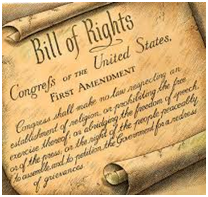 “Congress shall make no law respecting an establishment of religion, or prohibiting the free exercise thereof, or abridging the freedom of speech, or of the press; or the right of the people peaceably to assemble, and to petition the Government for a redress of grievances.”
“Congress shall make no law respecting an establishment of religion, or prohibiting the free exercise thereof, or abridging the freedom of speech, or of the press; or the right of the people peaceably to assemble, and to petition the Government for a redress of grievances.”
– 1st Amendment
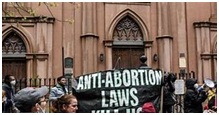 Protecting Places of Worship from Disruptive Protestors
Protecting Places of Worship from Disruptive Protestors
California’s Penal Code (302) reads:
(a) Every person who intentionally disturbs or disquiets any assemblage of people met for religious worship at a tax-exempt place of worship, by profane discourse, rude or indecent behavior, or by any unnecessary noise, either within the place where the meeting is held, or so near it as to disturb the order and solemnity of the meeting, is guilty of a misdemeanor punishable by a fine not exceeding one thousand dollars ($1,000), or by imprisonment in a county jail for a period not exceeding one year, or by both that fine and imprisonment. [302 PC has five additional points]
Examples of violations include:
• Interrupting a worship service
• Heckling a pastor during a religious service
• Yelling rude comments at people on their way into the service
• Making obscene gestures to those present at a church service
Every church or religious gathering needs to have plans to face a disruption:
• Find out if your community or state has an ordinance or law against disrupting a house of worship. If not, request of your council or legislators that one be passed.
• Be familiar with whatever protections your own state and locality might provide.
• Have a security team already trained and in place prior to any difficult situation.
• Call 911 immediately once a violation is observed or imminent.
• Remember the violation: 302-PC. Even better, have a copy of the section available.
• Notify any obvious leaders that protesters must not trespass on church property.
• A citizen arrest by one who observed the misdemeanor may be appropriate with care. The security team should be familiar with applicable citizen arrest codes.
• Indicate to law enforcement your desire that arrests be made and you are willing to press charges. Let authorities sort out the charges.
• Be prepared to offer forgiveness to any who sincerely express remorse to you.
Reasonable Limits to Protest in a Democracy
“The right to assemble and speak freely is essential to democracy. Erasing any distinction between the Public Square and private life is essential to totalitarianism. It is crucial, therefore, to protect robust demonstrations of political dissent while preventing them from turning into harassment or intimidation. . .
To picket a judge’s home is especially problematic. It tries to bring direct public pressure to bear on a decision-making process that must be controlled, evidence-based and rational if there is to be any hope of an independent judiciary.”
– Editorial Board, The Washington Post, May 8, 2022

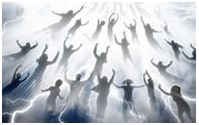 For Me, The “Rapture” Is Up in the Air!
For Me, The “Rapture” Is Up in the Air!
By Donald Shoemaker
PART TWO: The Second Coming of Christ and the Rapture of the Church in Paul’s Thessalonian Letters
In “Part One” I shared my movement away from a doctrinaire “Pre-tribulation Rapture” view toward (1) greater openness on the subject and (2) the observation that this subject is not a “Truth of the First Order” where we can speak with certainty. Rather, it is a “level three” or “level four” teaching, which carries less certitude and shouldn’t divide us.
In “Part Two” we see how Paul’s letters to the Thessalonian Christians contain an amazingly high amount of teaching on the Second Coming of Jesus. They also contain a surprisingly small amount of teaching (twice) on the Rapture, especially in light of how huge this teaching is in some circles. This is very significant in light of the fact that the Rapture is likely taught nowhere else in the Bible (possible exception: Matt. 24:30-31).
In this essay I’ll review the seven references in 1 and 2 Thessalonians to the Second Coming and the Rapture. Do these texts together support or lean toward the idea of the Second Coming being one comprehensive event? Or do they lead us to think of a separate “Second Coming A” (the Rapture) and a “Second Coming B” (the Revelation)?
Some points on the church at Thessalonica as we begin. It was a good congregation, dear to the Apostle Paul’s heart. It was founded by Paul during his second missionary journey after he entered today’s Europe for the first time (Acts 17:1-9). Shortly after, he travelled to Corinth and established a church there, remaining there for 18 months. During this extended period, he wrote his letters to the Thessalonians, in part to address some confusion in their minds over the Second Coming and to put their hearts at ease. Even good congregations can have some confusion! We may date these letters around AD 49-52.
1 Thessalonians 1:9-10 (New International Version) – “…you turned to God from idols to serve the living and true God, and to wait for his Son from heaven, whom he raised from the dead—Jesus, who rescues us from the coming wrath.”
• True conversion is both a turning away from something (idolatry here) and a turning toward something. These new Christians turned their hearts toward God and their hope toward Jesus’ return from heaven. The Second Coming must be, for believers, an anticipated event full of encouragement to good works.
• Jesus’ return will mean deliverance from wrath—the rescue is so certain Paul puts it in the present tense (“who rescues us”). In Paul’s writings, “wrath” is God’s justified actions of judgment against all evil and all who set themselves against him (Romans 1:18; 2:5, 8; 3:5; 4:15; 5:9; 9:22; 12:19) unless the context indicates otherwise (Romans 13:4-5, for the just wrath of the magistrate against evildoers). It is not the wrath of the Devil or the Antichrist. See comments on 1 Thess. 5:9.
1 Thessalonians 2:19-20 – “For what is our hope, our joy, or the crown in which we will glory in the presence of our Lord Jesus when he comes? Is it not you? Indeed, you are our glory and joy.””
• Jesus taught us to use our resources to win others so they might welcome us into eternal dwellings (Luke 16:9). So here, Paul labored to win people to Christ and establish them in their faith, so he might glory in Jesus’ presence with them.
• Paul here uses the word “parousia” for Jesus’ coming six times in the Thessalonian letters and once in 1 Corinthians 15:23. As we will see, it is one of three words Paul uses for the Second Coming. It can mean “arrival” or “presence.” F. F. Bruce says the word was used to describe “the official visit of a high-ranking personage to a province or city, when he was met on his approach by a deputation of leading citizens who escorted him formally for the remainder of his journey.”
1 Thessalonians 3:13 – “May he strengthen your hearts so that you will be blameless and holy in the presence of our God and Father when our Lord Jesus comes with all his holy ones.”
• The Second Coming, properly taught (without lots of speculation), both induces and requires holiness of life (being prepared and watchful for his coming). Here is a prayer that we will be holy on that Day. Perhaps the idea of accountability at the judgment is in view (“For we must all appear before the judgment seat of Christ, that each one may receive what is due him for the things done while in the body, whether good or bad.” – 2 Corinthians 5:10; see Romans 14:10).
• “Parousia” appears for the second time, translated “comes” (NIV), literally, “in the coming of our Lord Jesus.”
• Jesus will come “with all his holy ones.” This may refer to angels (“…he comes in his Father’s glory with the holy angels”—Mark 8:38; Luke 9:26; 2 Thessalonians 1:7). Or it may refer to the saints who will accompany Jesus when he returns (Revelation 19:14). The point would be, the Thessalonian believers will be “blameless and holy” and thus able to join the company of saints who will accompany Jesus. Robert Gundry sees this as a reference to disembodied souls of deceased saints who will accompany Jesus when he returns (1 Thessalonians 4:14).
1 Thessalonians 4:13-18 – “13 Brothers and sisters, we do not want you to be uninformed about those who sleep in death, so that you do not grieve like the rest of mankind, who have no hope. 14 For we believe that Jesus died and rose again, and so we believe that God will bring with Jesus those who have fallen asleep in him. 15 According to the Lord’s word, we tell you that we who are still alive, who are left until the coming of the Lord, will certainly not precede those who have fallen asleep. 16 For the Lord himself will come down from heaven, with a loud command, with the voice of the archangel and with the trumpet call of God, and the dead in Christ will rise first. 17 After that, we who are still alive and are left will be caught up together with them in the clouds to meet the Lord in the air. And so we will be with the Lord forever.18 Therefore encourage one another with these words.”
These verses are the first part of a long and very significant passage in 1 Thessalonians about the Rapture and the Second Coming. The second part is chapter 5, verses 1-11. I’m leaving the verse indicators intact in these longer passages. The chapter break is unfortunate, for it separates the second part from the much-more familiar first part.
First Part: Comfort replaces uninformed grief
• (13) As the first generation of Christians began to pass, living Christians understandably wondered how the departed would share in the blessings of Jesus’ return. Paul assures them of a hope not shared by those whose worldview omits any thinking about God and the afterlife.
• (14-15) Far from missing out on the hope, these who have “fallen asleep in him” will rise from the dead and be joined with Jesus in their glorified bodies (alternate view: the souls of deceased believers will accompany Jesus and be reunited with their bodies, which are then raised glorified). Those alive when Jesus returns will gain glorified bodies by being “changed” without dying (1 Corinthians 15:50-54).
• (15-17) A verbal record of something Jesus taught or a revelation from the Lord Jesus to Paul brought assurance that those dead when Jesus returns will not be at any disadvantage. Indeed, they will rise first and the living will have to catch up!
• (16) This will be a very noisy event (far from a “secret rapture”—see below). First a loud command (that could wake the dead! See John 11:38-44 for Jesus’ loud command at the tomb of Lazarus.). The archangel’s voice and a trumpet call follow.
• (17) Living saints are “caught up” with resurrected saints to meet the Lord in the air and are (together) forever with the Lord. But where? The text doesn’t say up or down, whether Jesus turns around or the saints turn around! The verb “caught up” (harpazein) suggests a strong action, often to the benefit of the one “caught up.” In Acts 23:10, Roman soldiers “caught up” Paul to save him from an angry crowd. In Revelation 12:5, the (Christ) child is “caught up” to God’s throne to save him from the dragon, which planned to devour him.
• I. Howard Marshal says, “The Greek word used here [apantesis, “to meet”] probably carries an allusion to the way in which a visiting dignitary might be met on the way to a city by a representative group of citizens who would then escort him back to the city.” When Paul arrived in Italy (Acts 28:15), some believers in Rome came “to meet” him and escort him to Rome. This would support the idea that the Rapture is part of the glorious Second Coming where Jesus returns to earth accompanied by the saints. The Rapture would thus be post-tribulational. However, F. F. Bruce cautions, “But there is nothing in the word ‘apantesis’ or in this context that demands this interpretation. It cannot be determined from what is said here whether the Lord (with his people) continues to earth or returns to heaven.” Cautious interpretation suggests that we not draw a firm conclusion “pre” or “post” from these verses. Leon Morris wisely says, “This is the fullest description of the Parousia in the New Testament, and when we reflect on the little that is said here we are warned against being unduly dogmatic about what will then happen.”
• The word “Rapture” comes from the Latin Bible’s verb for “caught up” (“rapio”).
• (18) The main point: “Take heart! The dead will rise and meet the Lord!”
1 Thessalonians 5:1-11 – “Now, brothers and sisters, about times and dates we do not need to write to you, we do not need to write to you, 2 for you know very well that the day of the Lord will come like a thief in the night. 3 While people are saying, “Peace and safety,” destruction will come on them suddenly, as labor pains on a pregnant woman, and they will not escape.
4 But you, brothers and sisters, are not in darkness so that this day should surprise you like a thief. 5 You are all children of the light and children of the day. We do not belong to the night or to the darkness.6 So then, let us not be like others, who are asleep, but let us be awake and sober. 7 For those who sleep, sleep at night, and those who get drunk, get drunk at night. 8 But since we belong to the day, let us be sober, putting on faith and love as a breastplate, and the hope of salvation as a helmet. 9 For God did not appoint us to suffer wrath but to receive salvation through our Lord Jesus Christ. 10 He died for us so that, whether we are awake or asleep, we may live together with him. 11 Therefore encourage one another and build each other up, just as in fact you are doing.”
Second Part: Alertness and sobriety replace sleeping and drunkenness
• (1)“Now” (peri de) introduces a new issue in the topic of Jesus’ return. In essence, be prepared! “Times and dates” (kronōn kai kairōn) refers to the End Times and its high points. Jesus told his disciples that we cannot know the “times and dates” (same nouns as in Acts 1:7). No matter, no problem—Christians have often tried to figure out “times and dates,” especially in the past 100+ years.
• (2-3) When “The Day of the Lord” arrives, most will not be prepared. Instead, they will be living as if it won’t happen and they are content with the illusion of “peace.” For them, “The Day of the Lord” will come like a thief and catch them by surprise.
• (4) Others will be prepared for this Day, awaiting it with eagerness and sober, godly living. For them, “The Day of the Lord” will NOT come like a thief, for they are ready.
• What is “The Day of the Lord?” It’s a day when God steps into human affairs to execute judgment and vindicate righteousness. The phrase may describe God’s judgment in history, like a locust invasion or army that drew people to repentance (Joel 1 & 2). “The Day of the Lord” also looks ahead to God’s final intervention in human affairs—the “great and dreadful day of the Lord” (Joel 2:31; Acts 2:20). Many will be ready for that day but many others will not be—the key point of
1 Thessalonians 5:1-11.
• (2, 4) “Like a thief in the night” is sometimes used to describe a pre-tribulational secret rapture (“Second Coming A”) as opposed to Jesus’ glorious public coming (“Second Coming B”). A movie named “A Thief in the Night” came out in 1972, depicting a secret rapture that left a lawn mower running unattended and a razor buzzing in the sink because their users were secretly raptured (apparently taking their pants with them). But this misses the point! The metaphor “thief” points to what is unexpected by the unprepared. It does not describe the nature of the Rapture. If Jesus’ return is to me “like a thief,” that’s my fault!
• (9) “For God did not appoint us for wrath, but to receive salvation…” The verse begins with “for” (hoti), giving a reason and incentive for us to maintain faith, hope and love (v. 8). Consistent with Paul’s use of the word “wrath” (orge), Paul is speaking of God’s wrath poured out on a world rejecting him. It does not refer to the “wrath” of the Devil (Revelation 12:12, using the word “thumos”) or other forces of evil we are forewarned to resist. The verse promises exemption from divine wrath rather than exemption from the Tribulation.
• There is a viewpoint known as “the pre-wrath rapture” theory—the Rapture will be near the end of the Tribulation before God casts his rapid worldwide judgments on the earth (Revelation 14:1-5, 14-16, chapters 15 & 16). This is not an unreasonable position, should the judgments proceeding from God’s “wrath” be so widespread and of such magnitude that Christ’s followers simply could not be exempt from them if they were around during that hour of judgment. If we try to reconcile
1 Thessalonians 5:9 with Revelation 14-16, we must proceed with humble caution, insomuch as we don’t know “the times or the dates” of such happenings. We’ll see…
1 Thessalonians 5:23 – “May God himself, the God of peace, sanctify you through and through. May your whole spirit, soul and body be kept blameless at the coming of our Lord Jesus Christ.”
• Jesus’ church is full of “spots and wrinkles and blemishes” (Ephesians 5:27). As I grow older, I see these increasing on my body. But in a maturing church there should be fewer and fewer of these due to God’s cleansing and holiness-producing ministries for us. Our confidence in the Second Coming actually induces moral purity (1 John 3:2-3). On the Day of Jesus’ return this process will be complete.
• “Spirit, soul and body” are not three “parts” that comprise us (the doctrinal term for this is “trichotomy”) any more than loving God with all our “heart, soul, mind and strength” (Mark 12:30) means we have four parts. Rather, we are to love the Lord and be kept blameless through and through, with all our being.
• “The coming of our Lord” gives us the fourth use of parousia (“arrival, presence”) in these two letters (after 2:19, 3:13, 4:15). Paul doesn’t infer two parousias, but just one (with the definite article, “the coming,” which includes the Rapture).
2 Thessalonians 1:6-10 – “He will pay back trouble to those who trouble you 7 and give relief to you who are troubled, and to us as well. This will happen when the Lord Jesus is revealed from heaven in blazing fire with his powerful angels. 8 He will punish those who do not know God and do not obey the gospel of our Lord Jesus. 9 They will be punished with everlasting destruction and shut out from the presence of the Lord and from the glory of his might 10 on the day he comes to be glorified in his holy people and to be marveled at among all those who have believed. This includes you, because you believed our testimony to you.”
• This is clearly a reference to Jesus’ Second Coming in power and glory (“Second Coming B” if you follow that scheme). Its dramatic display for all to see is underscored by “revealed from heaven in blazing fire with his powerful angels.”
• Important point: It seems to me that the church’s relief from persecution (“relief to you who are troubled”) would be fulfilled at the Rapture if it were pretribulational rather than at “Second Coming B.” But that is not what these verses say. Final relief from persecutors comes when Jesus is gloriously revealed, not before.
• “Revealed from heaven” introduces a new word describing the Second Coming—apokalupsis. The word goes beyond “presence” (parousia) to convey Jesus’ very open manifestation in contrast to his present hiddenness. His lordship will be revealed in power and glory and he will openly dispense justice. It will be “pay back hour” for all who have persecuted the church (“those who trouble you”).
• Jesus will be “glorified” and “marveled at” by his saints who surround him. My thoughts go to Revelation 19:14 – “The armies were following him, riding on white horses and dressed in fine linen, white and clean” (Jesus’ bride has already clothed herself in “fine linen, bright and clean,” which are all her righteous acts—19:5-6). In fact, the whole openly glorious description of the Second Coming (Revelation 19:11-16) fits apokalupsis quite well.
2 Thessalonians 2:1-8
This final passage on the Rapture and Second coming is clearly the most challenging! How we interpret it will pretty well determine whether we hold to a “pre” or “post-trib” Rapture. The whole context (2:1-12) is really the heart of 2 Thessalonians.
“Concerning the coming of our Lord Jesus Christ and our being gathered to him, we ask you, brothers and sisters, 2 not to become easily unsettled or alarmed by the teaching allegedly from us—whether by a prophecy or by word of mouth or by letter—asserting that the day of the Lord has already come.”
• Verse 1 is a beautiful summation of “the Rapture.” At this event, (1) Jesus will arrive (the parousia) and (2) his followers will be “gathered [episunagōgēs] to him.” The latter word is only used one other time in the New Testament—for the gathering of believers in worship assembly (Hebrews 10:25). It is also used in 2 Maccabees for the regathering of Israel after her Babylonian exile. These few words very nicely sum up the detailed teaching on the Rapture in 1 Thess. 4:15-17. The two passages are, as I said earlier, the only likely references to the Rapture in the whole Bible.
• Even a very good church can be troubled by bad doctrine. This church risked being “unsettled” and “alarmed” by teaching purportedly from the Apostle Paul, who would now set their hearts at ease.
• The misleading teaching may have come by someone’s (false) word of prophesy, or by a report that Paul taught these things, or a misunderstanding of what he had taught when with them, or even by a letter claiming to be from him. Paul didn’t know. Whichever, what “word” was so disturbing? “The day of the Lord had already come.” If true, they had missed out on its blessings. If true, their hope for relief from sufferings and persecution was a false hope. There will be no relief!
• The return and gathering of verse 1 is referred to in verse 2 as “the day of the Lord.” It is wrong to separate, as some do, the “Rapture” from “the day of the Lord.”
“3 Don’t let anyone deceive you in any way, for that day will not come until the rebellion occurs and the man of lawlessness is revealed, the man doomed to destruction. 4 He will oppose and will exalt himself over everything that is called God or is worshiped, so that he sets himself up in God’s temple, proclaiming himself to be God.”
• Whatever was said by whatever means, Paul counters, “Don’t be deceived.” More than just saying, “Get over it!” he gives the reason why they need not be unsettled. Before the “coming of the Lord Jesus Christ,” before the “gathering together,” two events must happen first: (1) the rebellion (apostasia—“apostasy”) and (2) the revealing (apokalupsthē, a verb form of apokalupsis) of “the man of lawlessness.” Since those haven’t happened, the day of the Lord cannot have happened either!
• I suggest these two happenings be viewed as one leading to the other. Great apostasy (moral, spiritual, doctrinal rebellion) welcomes the “man of lawlessness.” The soil of sin and falsehood readily receives the seed.
• A very small number of interpreters have said the word apostasia refers to the “departure of the saints in the Rapture.” If this were correct, as Charles Ryrie noted, this would be a clear text that the rapture precedes the arrival of the Antichrist. But Ryrie and almost all “pre-trib rapture” teachers reject it.
• “The man of lawlessness” is also called “the man doomed to destruction” (literally, “the son of destruction”). Elsewhere in scripture he is the Antichrist (1 John 4:3) and the “beast out of the sea” (Revelation 13:1). At the Second Coming he will be overthrown by Jesus’ breath and destroyed by the splendor of his coming (verse 8).
• But until then, once he comes look out! He will be the archenemy of God and his people. He will exalt himself over God and even set himself up “in God’s temple proclaiming himself to be God.” Other scriptures point to his blasphemy and persecution of the saints and to the worship he will demand (Revelation 13:5-17).
• Does this text tell us that a temple to God will be built (in Jerusalem on the Temple Mount)? This has been rumored for decades. I have two realistic comments. First, expect “the mother of all wars” if the Dome of the Rock were ever demolished to make room for a new temple. Won’t happen. Second, I think this notion counters the claim by many “pre-trib rapture” advocates that the Rapture will happen suddenly with no signs preceding it. How many years would it take for a new temple to be proposed, designed and constructed and then for some time to pass before this “man of lawlessness” can occupy it? Certainly much of this project must precede a Rapture that would come (as many propose) 3-1/2 years before this temple blasphemy occurs. Yes, there were three actual desecrations of the Second Temple before the Romans destroyed it and the city in AD 70. But I’m prepared to see this reference to a “temple” as metaphorical of how “the man of lawlessness” will seek to displace God. Gordon Fee says, “By the time Paul wrote this letter the temple in Jerusalem no longer held any importance to him*, except in a symbolic way to remind others of God’s past presence with his people.” [*Is no “importance” an overstatement? Perhaps “no salvific importance.” His overall comment stands.] I find it very unlikely that Paul would call a rebuilt temple in the End Times “God’s temple” in light of his spiritualizing of the temple elsewhere (Ephesians 2:19-22).
5 “Don’t you remember that when I was with you I used to tell you these things? 6 And now you know what is holding him back, so that he may be revealed at the proper time. 7 For the secret power of lawlessness is already at work; but the one who now holds it back will continue to do so till he is taken out of the way. 8 And then the lawless one will be revealed, whom the Lord Jesus will overthrow with the breath of his mouth and destroy by the splendor of his coming.”
• (5-6) In this case, the church’s angst over the Day of the Lord was due to her forgetting what the apostle had taught in person. She just needed to be reminded. Our limitation is we don’t know all that Paul taught them. For a big example, we don’t know what it is that restrains this man of lawlessness from being revealed. Paul doesn’t repeat all he taught this church for the sake of later Bible students, and humble teachers of the Bible shouldn’t teach what isn’t given to them to teach!
• (6, 7b) Paul uses both the neuter “what is holding him back” and the masculine “the one who now holds it back.” Once this restraint/restrainer is removed, the man of lawlessness will be revealed.
• (7a) Evil, “the secret power of lawlessness,” is with us now. We see it and suffer from it often and sometimes fall into it ourselves. We must expose today’s evils and resist them by God’s enablements, while knowing that much greater evil lies ahead.
• (7b-8a) Once the restraint is removed, the man of lawlessness will step forth. We see God’s sovereignty here even against the forces of evil. This is a key theme throughout the Book of Revelation (see Revelation 17:17).
• We can’t restrain curiosity, can we? What/who might this restraint/restrainer be? Some say: the restraint of the state doing its proper role (Romans 13:1-7) and personified in its leader (Rome and its emperor, and all subsequent restraining powers). When this authority collapses, the man of lawlessness will emerge. Some says it’s the Holy Spirit (“spirit, pneuma” is neuter, yet the Spirit is a “he”). This would be God’s Spirit in his role of restrainer. But then this view adds a second layer: this is the Holy Spirit insofar as he indwells the church, and he is removed when the church is raptured (hence, before the man of lawlessness can be revealed). This second point is handy but speculative. And farfetched. It requires that all the evangelism during the Great Tribulation (and there are many converts—Revelation 7:9, 13, 14) and all the strength required to resist the Tribulation’s great evil will be accomplished without the Spirit’s indwelling. It also requires that the Spirit, a key blessing of the New Covenant and a benefit Jesus said would be with his followers forever (John 7:37-39, 14:16; Acts 2:17-18), will be removed as if the Covenant and Pentecost are reversed. No, this is a wrong view. Truth be told, we don’t know what or who the restrainer is. Gary Demarist quotes Augustine (“I admit that the meaning of this completely escapes me.”) and adds, “Three cheers for Augustine!”
• (8b) We do know that the days of the man of lawlessness are numbered and he will be destroyed by the glory of the Second Coming. After one final bold resistance he is cast into the “lake of fire” (Revelation 19:19-20).
• Paul now adds a third magisterial word for the Second Coming: epiphaneia—“…the splendor [display] of his coming [parousia].” The word could describe a visit by the emperor. It well fits Paul’s emphasis on the power and glory of the returning Lord.
Reflecting on what has been said…
Good Bible teachers differ on many points of Bible prophecy—some minor, some major. But they do not differ on the fundamentals. Remember the announcement given when Jesus ascended into heaven (Acts 1:11): “This same Jesus, who has been taken from you into heaven, will come back in the same way you have seen him go into heaven.”
With the Second Coming of Jesus, his followers (living and resurrected) will, with glorified bodies, be united with Jesus forever. All will face a Day of Judgment. Those who believe the Bible will differ on whether there is one resurrection or more, and one judgment or more. But there is no denial of either resurrection or judgment.
It is with the nature, relationship and sequence of End Time details that conscientious students of the Bible differ. At times the differing has been acrimonious, divisive and a tad self-righteous, with the “heresy” label applied to others. We should regret this because of its harm to Christian unity and because it impedes our ongoing search together for biblical answers (or recognition that some answers must await the fulfillment of the prophecies).
Is the Second Coming one comprehensive event that encompasses the resurrection of the saints and the rapture of the Church? Or is there enough contrast between details so that a distinction and separation between the Rapture and Jesus’ full Revelation (what I’ve called “Second Coming A” and “Second Coming B”) should be maintained? And if there is separation, does the Bible further support the teaching that the Great Tribulation will intervene (thus exempting Christians from that agony)? In fact, does the Bible even teach a
seven-year Tribulation? Or might it be a 3-1/2 year Tribulation period (Revelation 13:5)?
Based on my reading of Scripture, especially of the “Second-Coming-rich” Thessalonian epistles, I think that viewing the Second Coming as a multi-faceted yet comprehensive event has greater biblical support than does the view of a separate Rapture and Revelation. It may come across self-serving to say so, but I think the burden of proof lies with the latter interpretation. Paul’s Thessalonian letters do not warrant that interpretation.
This is not to say that a Post-tribulation Second Coming view is without problems. All the views on the Rapture have their problems. If the final outpourings of God’s wrath found in Revelation 15-16 are literal and as intense as described, it is hard to imagine that Jesus’ faithful followers who are promised exemption from God’s wrath could still be present on earth (hence, some prefer the “pre-wrath” rapture view). Since I hesitate to impose human time reckoning on prophetic scriptures and their metaphors (Acts 1:7), I’m content to live with this question.
Above all, I want to keep an open mind on what and how the Bible teaches about the future. And I want to grow in knowledge through fellowship and study with those who agree or differ with me.
In “Part Three” I’ll discuss prophecy issues further. Thank you for walking with me.
www.donaldshoemakerministries.com
Contact me at: donaldshoemakerministries@verizon.net
Don has been a member of the clergy in the Long Beach, California area since 1970. He now serves as Pastor Emeritus of Grace Community Church of Seal Beach (where he was senior pastor 1984-2012) and as Senior Chaplain of the Seal Beach Police Department (2001+). He previously was an assistant professor of Biblical Studies at Biola University (1976-84) and chaired the Social Concerns Committee in the Fellowship of Grace Brethren Churches from 1985 to 2019.
His graduate work includes a Master of Divinity from Grace Theological Seminary, a Master of Theology from Fuller Theological Seminary with a concentration in Christian ethics, and a Doctor of Ministry from American Baptist Seminary of the West (now Berkeley School of Theology) with a concentration on the Charismatic Movement. His law school studies included a course on the First Amendment. He and his wife Mary have been married for over 55 years. They have two children and six grandchildren.
© 2022 Donald P. Shoemaker

